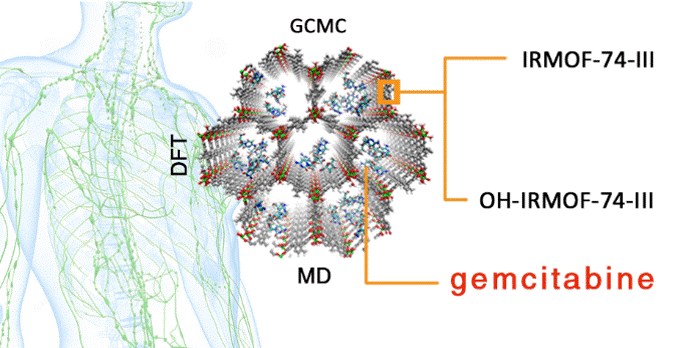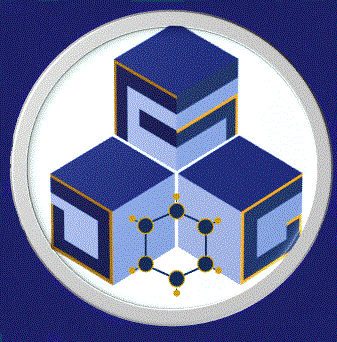Drug Delivery.
 Metal-Organic Frameworks (MOFs) have been recently used as potential nanocarrier platforms in biomedical applications
such as drug storage and delivery, due to their low toxicity, biodegradability, high internal surface area, widely tunable composition,
high payloads and controlled drug release.
In our group we use computational techniques that have been performed to study anti-cancer drug delivery in MOFs. Computational simulations
can offer a unique insight into the drug adsorption and diffusion mechanisms in porous nanocarriers at the atomic level, since a clear
molecular-level understanding is important for the development of novel drug delivery systems with better control of drug administration.
The calculated drug loading capacities of the reported MOFs are in good agreement with the experiments, making these materials promising
for drug storage with exceptional payloads. The simulations also revealed a slow drug release rate for the stated MOFs, reducing the side
effects of the traditional medication and thus improving the life expectancy of the patients affected by cancer. This research will be
useful to identify the most auspicious MOFs in cancer therapy prior to experimental studies and to effectively design smart nanocarriers
able to deliver chemotherapeutics specifically to the damaged cells and to release them in a controlled way, offering a primary virtue over
conventional therapy.
Metal-Organic Frameworks (MOFs) have been recently used as potential nanocarrier platforms in biomedical applications
such as drug storage and delivery, due to their low toxicity, biodegradability, high internal surface area, widely tunable composition,
high payloads and controlled drug release.
In our group we use computational techniques that have been performed to study anti-cancer drug delivery in MOFs. Computational simulations
can offer a unique insight into the drug adsorption and diffusion mechanisms in porous nanocarriers at the atomic level, since a clear
molecular-level understanding is important for the development of novel drug delivery systems with better control of drug administration.
The calculated drug loading capacities of the reported MOFs are in good agreement with the experiments, making these materials promising
for drug storage with exceptional payloads. The simulations also revealed a slow drug release rate for the stated MOFs, reducing the side
effects of the traditional medication and thus improving the life expectancy of the patients affected by cancer. This research will be
useful to identify the most auspicious MOFs in cancer therapy prior to experimental studies and to effectively design smart nanocarriers
able to deliver chemotherapeutics specifically to the damaged cells and to release them in a controlled way, offering a primary virtue over
conventional therapy. References
[1] "Multiscale simulations reveal IRMOF-74-III as a potent drug carrier for gemcitabine delivery", Kotzabasaki, M.; Galdadas, I.; Tylianakis, E ; Klontzas, E.; Cournia, Z.; Froudakis, G.E.;, JOURNAL OF MATERIALS CHEMISTRY B, 5 (2017) 3277-3282.
[2] "OH-functionalization strategy in Metal-Organic Frameworks for drug delivery", Kotzabasaki, M.; Tylianakis, E ; Klontzas, E.; Froudakis, G.E.;, Chemical Physics Letters 685 (2017) 114-118.
[3] "Review of computer simulations on anti-cancer drug delivery in MOFs", Kotzabasaki, M.; Froudakis, G.E.;, Inorganic Chemistry Frontiers 5 (2018) 1255-1272.

